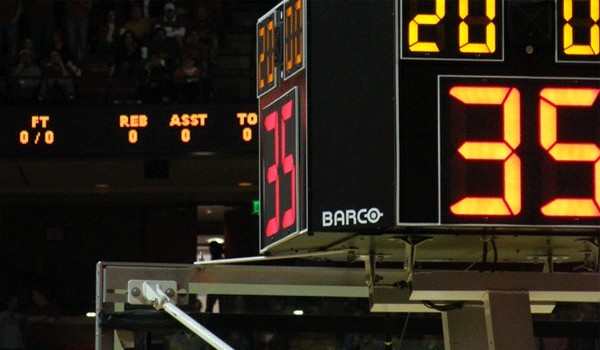On the clock: Georgia teams experimenting with shot clock
Thirty-five seconds sit on the new square box that is fixated on the wall of Miller Grove's spacious Purple Palace gymnasium.
Some recognize it. Others dismiss it. A few don't even realize it is there until the horn sounds. And, boy, does it sound. Loudly.
Thirty-five seconds. Time to make a decision. Time to make a play. Time to speed up the pace.
For those coaches and teams playing in Miller Grove's summer league, it is also a time to try out an experimental shot clock. The Georgia High School Association, and the majority of other state associations, don't operate the basketball season with a shot clock.
Miller Grove head coach Sharman White wanted to experiment. He had a long line of teams that wanted to join in on the experiment, too. The Wolverines, five-time state champions, are joined by Banneker, Hiram, Johnson-Gainesville, Luella, M.L. King, Morgan County, North Clayton, Saint Francis, Stone Mountain, Therrell, Tucker and Washington.
If team camp is about learning and discovering new things about your team, then the shot clock league could be the best place to time to test out the 35 second ticker.
Tucker head coach James Hartry said he jumped at the chance to test it out with his team.
"I think it is long overdue," Hartry said. "With the caliber of talent that you have now coming out of Georgia, ain't nobody sitting back and holding the basketball anymore. This is an up and down game now. The kids don't want to hold the ball now. It makes the game better. It makes the defensive side of the better, too. You want guard somebody? You want to play somebody? You can do that with the shot clock."
Morgan County coach Charlemagne Gibbons said the clock allows for more teaching.
"From a coaching perspective, I think it helps kids from an awareness standpoint. I think it keeps them honest. With no clock, you can just keep turning the clock over and over. I think the clock helps teach our guys on how to add some pace to the game. So, I'm for it a 100 percent."
M.L. King head coach Eddie Johnson said he hopes the clocks will improve coaching.
"I know a lot of coaches like that style of play, that fast-paced kind of game," Johnson said. "Really, I think the shot clocks will show who can coach and who can't...I'm a 100 percent behind it."
The players didn't seem to mind it. In fact, there was only one possession on Wednesday night at the league where there was a shot clock violation in five games played.
For St. Francis rising sophomore Guard Kobi Simmons, he barely noticed the clock during the game.
"I think at St. Francis we play really fast so I'm not sure a shot clock would mean all that much to us," Simmons, the top player in Georgia's 2016 class, said. "There's no real pressure on us and I think the coaches help us understand how to play fast."
Teammate Kaiser Gates echoed the thought.
"Most of the time I don't even pay attention to it," Gates said. "But I think I would like it. It pushes the tempo up some more. The benefit is getting more shots up as a team. More people are going to get involved."
What did the players like about the clock? Tucker wing Shembari Phillips saw the value for in-game opportunities.
"It is a good in certain situations," Phillips said. "In the end if we are in crunch time, it will help us to use the shot clock to our advantage."
Miller Grove point guard Keith Pickney has played with a shot clock all spring on the Nike EYBL circuit. He said having 35 seconds per possession has helped him with decision-making.
"You just have to be smart offensively and you just have to be aware. It can creep up on you pretty quick," Pickney said. "As a point guard and a leader, when the shot clock is running down I have to create off the dribble or get a shot off. A lot of times, 10 seconds doesn't allow you a really good play. You have to create at that point."
The league will run until June 26 at Miller Grove. The plan after the league is to address the GHSA and discuss the advantages of having the shot clock. The question becomes whether or not the governing body will listen to change.
"(GHSA director Ralph) Swearingan does a great job in listening to us. He understands that without us, there isn't basketball," Hartry said. "He will sure listen when Doug Lipscombs, Sharman Whites, James Hartrys, coaches that have been in the league awhile and had a little success call. I'm sure he'll listen," Hartry said.
"If we get this shot clock thing going in Georgia, people are going to be walking around asking ourselves 'Why in the hell did we not use this before?'"





